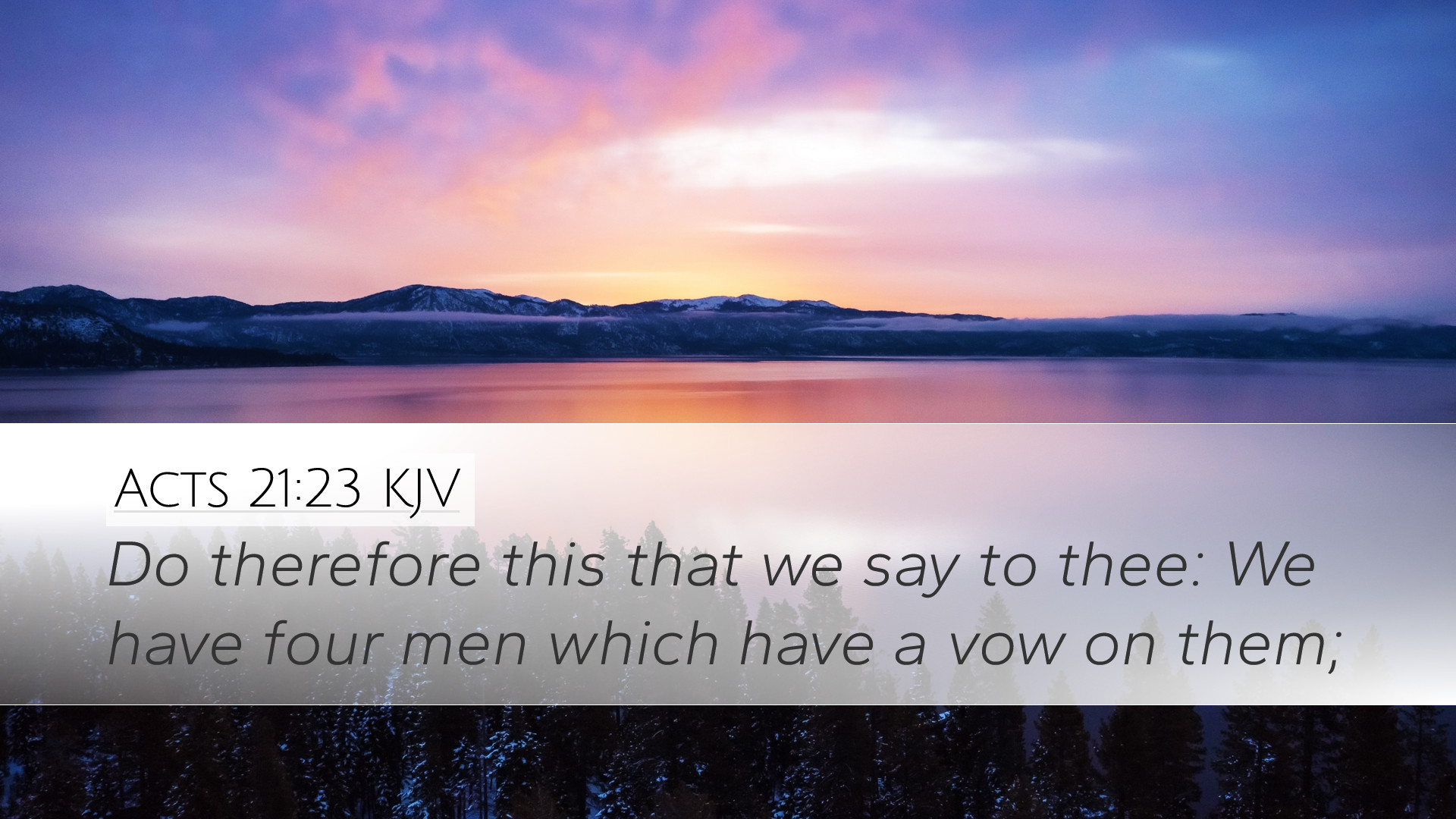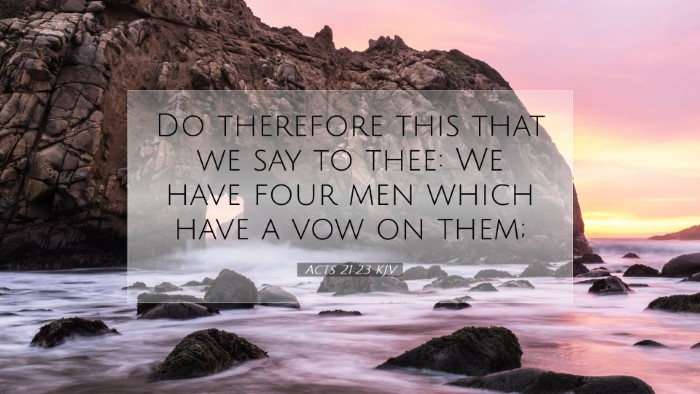Commentary on Acts 21:23
In Acts 21:23, we find a pivotal moment in the Apostle Paul's journey that highlights important theological and practical themes relevant to the early church and the present-day believer. This verse serves as a springboard for discussions on the relationship between Jewish customs and Christian faith, the role of the Apostle Paul in the early church, and the implications of his actions for the spread of the Gospel.
Contextual Background
Before delving into the analysis of Acts 21:23, it is imperative to understand the context of the verse. Paul, having returned to Jerusalem, is faced with the task of reconciling his past as a Pharisee with his current mission to the Gentiles. The tension between Jewish believers who held fast to the Law and Gentile converts who were free from it was escalating. This verse occurs in a broader narrative where Paul is advised to take certain actions to appease the Jewish Christians and ensure his safety.
Text of Acts 21:23
Acts 21:23 (KJV): "Do therefore this that we say to thee: We have four men which have a vow on them."
Commentary Analysis
Matthew Henry's Perspective
According to Matthew Henry, this verse reflects the counsel given to Paul by the Jerusalem elders. They were concerned about the rumors circulating about him teaching Jews to forsake the Law, which was galvanizing opposition against him. Henry highlights the significance of the 'vow' mentioned, most likely a Nazarite vow, indicating a willingness to adhere to Jewish customs while continuing the ministry to the Gentiles. He notes, "Paul was not so exalted above his brethren, but that he might condescend to their weaknesses." This condescension underscores Paul’s commitment to unity within the body of Christ, emphasizing that while he preached freedom from the Law, he did not want to offend or alienate his fellow Jews.
Albert Barnes' Insights
Albert Barnes elaborates on the implications of Paul's actions in this context. Barnes reflects on the dilemma Paul faced and the necessity of wisdom in handling cultural differences within the church. He suggests that Paul’s willingness to participate in the purification rites was a demonstration of his love for the Jewish community and his desire to promote peace. Barnes states, "If you are to be in their midst, you should not be so unwise as to contradict their customs." This sentiment reiterates the crucial balance of preserving one's faith while being considerate of others within the community of believers.
Adam Clarke's Detailed Exposition
Adam Clarke provides a detailed examination of the 'vow' mentioned in the text. He discusses the context of such vows in Jewish culture, particularly the Nazarite vow, which required specific rituals and offerings. Clarke emphasizes that Paul's participation was not merely a political move but a deeply considered action aimed at fostering camaraderie and understanding among believers from different backgrounds. He argues, "Paul shows us the art of gracefully navigating the waters of cultural differences," a vital skill for anyone engaged in pastoral ministry or evangelism today.
Theological Implications
This verse and its commentary illuminate several theological implications:
- Integration of Faith and Culture: The integration of faith and culture is exemplified in Paul's action. While proclaiming the freedom of the Gospel, he does not forsake elements of his Jewish heritage, thereby allowing him to engage with Jewish believers meaningfully.
- Unity in Diversity: The call for unity within diversity becomes a central theme. Paul’s actions serve to bridge potential divides and promote harmony, which reflects the overarching theme of the New Testament concerning the unity of believers.
- Pastoral Wisdom: For pastors and leaders, this narrative offers critical insights into pastoral wisdom, demonstrating that strategic condescension and humility can facilitate the Gospel's acceptance across cultural barriers.
Practical Applications
Reflecting on Acts 21:23 can yield several practical applications for contemporary believers:
- Understanding Cultural Sensitivities: Just as Paul navigated the complexities of Jewish customs, modern believers are called to understand and respect varying cultural practices within their contexts.
- Promoting Unity: Acts of kindness and accommodation within diverse congregations can foster environments that promote unity and fellowship regardless of cultural differences.
- Exercising Flexibility: Believers should embrace flexibility in non-essential matters to propel the mission of the church while remaining grounded in essential truths of the faith.
Conclusion
Acts 21:23 serves as an essential reminder of the need for wisdom and sensitivity in ministry settings. By reflecting on the insights provided by eminent commentators like Matthew Henry, Albert Barnes, and Adam Clarke, we glean valuable lessons on balancing grace and truth, cultural understanding, and fostering unity among diverse believers. As leaders, scholars, and students immerse themselves in this discourse, they are encouraged to regard congregational unity and cultural engagement as vital components of effective ministry in today's world.


